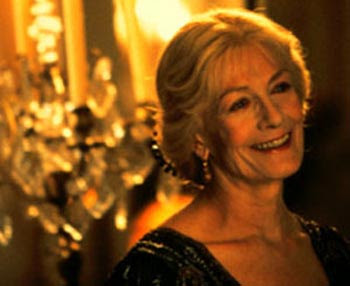Mrs. Dalloway: Movie Review (2008)

Directed by Marleen Gorris, written by Eileen Atkins, based on the novel by Virginia Woolf, 97 minutes, rated PG-13.
“Mrs. Dalloway,” the solid adaptation of Virginia Woolf’s great novel, is about the person forever poised on the road not taken while remaining tenuously rooted in a present filled with misgivings, uncertainties and what ifs.
As Clarissa Dalloway, a woman of certain means whose internal voices are far more rebellious than her polished exterior suggests, Vanessa Redgrave is terrific; listening to her exhale Woolf’s dialogue is reason enough to see the film. Though tall and broad-shouldered, her Dalloway is nevertheless a regal swan--albeit one who has clipped her own wings.
Focusing on a single June day in 1923 London, the film--and the book--follows Clarissa as she prepares for a party that will bring with it a whirlwind of conflicting emotions as she looks back on her life--and sees with anguished clarity precisely how she has blown it.
In her youth, this once gorgeous, playful woman had two suitors: the adventurous Peter Walsh and the rather benign--yet more stable and successful--Richard Dalloway. Choosing safety over uncertainty, Clarissa took Richard for her husband, but was he the right man? Would her life had been more fulfilling, more exciting, more romantic had she run off with the more daring Peter? That question forever lingers within Clarissa, coloring her days every bit as much as her decision to marry Richard has diminished the bright dreams of her youth.
Throughout the day, Clarissa wrestles with her choices, her fears and her disappointments, while at the same time a young man she never meets, the deeply disturbed war veteran Septimus Warren Smith (Rupert Graves), mirrors her own concerns about what makes us go on.
When Septimus leaps from a window, impaling himself on an iron railing, he does so just hours before Clarissa’s party, which shakes her so deeply it sends her into herself, where she sees clearly for the first time the life of “corruption, lies and chatter” she chose mainly out of cowardice.
“Mrs. Dalloway” is an excellent film that moves seamlessly between past and present, mediocrity and success, death and life, hope and despair. It is at its best during Clarissa’s party--her supremely bitchy party--where her interior monologue comes alive as she greets her guests with warm smiles, pleasant hellos--and a barbed tongue that skewers them all straight to their British bones.
Director Gorris, whose “Antonia’s Line” won an Academy Award for best foreign film in 1995, had the difficult job of capturing the essence of a novel that remained mostly in the mind of its protagonist, melding memory, allusion and observation into an electrically charged stream-of-consciousness; she has succeeded, though in the translation, she has lost some of the novel’s subtlety.
Lucky for Gorris (and for us) that she had Redgrave, whose expressive eyes and haunting voice allow us into an interior that is so much in turmoil, it gives this film a depth it otherwise may not have had.
As for Woolf, in the end she was more Septimus than Clarissa: In March of 1941, the author threw herself into the Ouse River, ending her life and with it her remarkable talent.
Grade: A-













November 24, 2008 at 3:13 PM
I can't wait to see and get it!